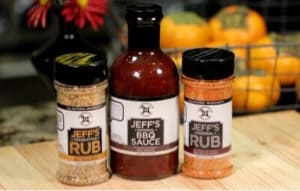I'm going camping at the beach this weekend, and was thinking of brining chicken in sea water just to see (sea?) what would happen. I know folks up in Maine cook lobsters in sea water, so I would think as long as the chicken was smoked to a safe temp it shouldn't be a health hazard. I suppose I could boil it first then chill it, but I'd be afraid that might alter the mineral content, thus killing any characteristic flavor it might impart. We eat fish that spend their whole lives in the ocean, and where I'm going isn't a polluted area nor are there any biological hazard warnings. Am I crazy?
Sea water as a brine?
- Thread starter mdboatbum
- Start date
-
Some of the links on this forum allow SMF, at no cost to you, to earn a small commission when you click through and make a purchase. Let me know if you have any questions about this.
You are using an out of date browser. It may not display this or other websites correctly.
You should upgrade or use an alternative browser.
You should upgrade or use an alternative browser.
SMF is reader-supported. When you buy through links on our site, we may earn an affiliate commission.
Having spent a bunch of time on the ocean, I'd probably boil it first to be on the safe side. There's lots of living organisms that you can't see swimming around in there. With that said, I have eaten rock scallops right out of the shell washed off in ocean water...
jcurrier
Smoke Blower
Being a "Mainer" and raising 1000's of oysters here in our briny waters each year, I would say check with your local Marine Resource office and make sure there are not any closures due to red tide, sewage plant malfunctions (or other issues) in the area were you are going. Then I guess, if you have the option to get the water from a location not directly on the shoreline, grab a bucket and filter through cheesecloth or similar to take out the larger particles. Don't forget you will have to chill, even up here our waters are approaching the upper 40's and low 50's near shore
Last edited:
We folks up in Maine Steam lobsters with sea water.... I know folks up in Maine cook lobsters in sea water...
I think your chicken may end up way too salty, but that's just my opinion
If my math is correct, which is almost the case, a typical 1 cup of salt per gallon of water brine is between 6% and 8% salt, whereas sea water is 3.5% on average. This is in the realm of the concentration many use, roughly 1/2 cup of salt per gallon of water, so I don't think it would be any saltier than brining in the traditional manner. I do have some doubt whether there will be any appreciable difference in flavor. I'm kinda hoping that some of the dissolved minerals might impart a "briny" flavor, but I'm guessing that won't be the case. I'm willing to try just for fun, but I'd rather not get sick in the process.
I know that many blue water cruisers use a 2:1 Fresh water to sea water ratio to boil pasta and veggies. Once again "boil". Though the salinity varies it is approximately 3.5% salt. 100mil. contains 3.5g of salt. So that would be 3/4 of a teaspoon per 3.38 ounces or 3/4 teaspoon per 1/2 cup of water if I did the math correctly!
Well the trip ended up being cancelled. So my sea water brine experiment will have to wait for another time.
Actually the 2:1 ratio figures to 1.2% salt, not very salty compared to sea water.I know that many blue water cruisers use a 2:1 Fresh water to sea water ratio to boil pasta and veggies. Once again "boil". Though the salinity varies it is approximately 3.5% salt. 100mil. contains 3.5g of salt. So that would be 3/4 of a teaspoon per 3.38 ounces or 3/4 teaspoon per 1/2 cup of water if I did the math correctly!
Your 3/4 tsp to 1/2 cup water is correct, the 3.38 ounce measure is not accurate, IDK how you got that number.
SmokingMeatForums.com is reader supported and as an Amazon Associate, we may earn commissions from qualifying purchases.
Similar threads
- Replies
- 12
- Views
- 2K
- Replies
- 48
- Views
- 4K
- Replies
- 4
- Views
- 1K
- Replies
- 27
- Views
- 3K
Hot Threads
-
Our Second piece of Heaven, Little piece on the Atlantic Ocean
- Started by DRKsmoking
- Replies: 57
- General Discussion
-
How Do I Get Rid of These Armadillos?!!
- Started by seenred
- Replies: 42
- Blowing Smoke Around the Smoker.
-
Non fat dried milk
- Started by hog warden
- Replies: 37
- Sausage
-
Featured A couple thick strips please!
-
Getting to the bottom of what happens to cure in smoked sausage
- Started by hog warden
- Replies: 31
- Food Safety




